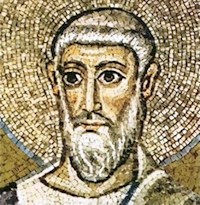
Daily Readings for:July 30, 2014
(Readings on USCCB website)
Collect: O God, who made the Bishop Saint Peter Chrysologus an outstanding preacher of your incarnate Word, grant, through his intercession, that we may constantly ponder in our hearts the mysteries of your salvation and faithfully express them in what we do. Through our Lord Jesus Christ, your Son, who lives and reigns with you in the unity of the Holy Spirit, one God, for ever and ever.
RECIPES
ACTIVITIES
o Discovering and Developing Gifts
PRAYERS
o Collect for Feast of Sts. Abdon and Sennen
o Novena In Honor of Saint John Marie Vianney
LIBRARY
o The Age of Patrology | Sal Ciresi
o The Saintly Scholars of the Church | Fr. Stephen McKenna
· Ordinary Time: July 30th
· Optional Memorial of St. Peter Chrysologus, bishop and doctor
Old Calendar: Sts. Abdon and Sennen, martyrs; St. Germanus, bishop (Hist)
St. Peter Chrysologus ("the man of golden speech") earned the title of Doctor of the Church for his eloquent sermons, of which some two hundred remain. Made Archbishop of Ravenna by miraculous intervention of St. Peter in 433, he rooted out all remaining traces of paganism, as well as a number of abuses among the Christians. In his sermons he strongly urged frequent Communion. He is supposed to have given us the saying: "He who wants to laugh with the devil cannot rejoice with Christ." St. Peter died about the year 450 in his native city of Imola.
According to the 1962 Missal of St. John XXIII the Extraordinary Form of the Roman Rite, today is the feast of Sts. Abdon and Sennen: two eastern martyrs, probably Persians. Their cult at the Pontian cemetery seems to show that they met their death in Rome. In the ninth century their bodies were translated to the church of St. Mark. St. Peter Chrysologus' feast is observed on December 4.
St. Peter Chrysologus
In the fifth century, Ravenna, not Rome, was the capital of the Roman Empire in the West, and Ravenna itself became a metropolitan see. St. Peter Chrysologus was one of the most distinguished archbishops of that see.
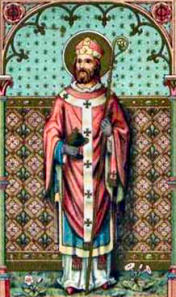
Peter was born in Imola about the year 400 and studied under Cornelius, bishop of that city, who ordained him deacon. In 433, the archbishop of Ravenna died, and when a successor had been chosen by the clergy and people of Ravenna, they asked Bishop Cornelius to obtain confirmation of their choice from Pope Sixtus III. On his trip to Rome, Cornelius took his deacon, Peter, as his companion; upon seeing Peter, the pope chose him for the see of Ravenna instead of the one selected by the clergy and people of Ravenna.
Peter was consecrated and was accepted somewhat grudgingly at first by both the clergy and the people. Peter, however, soon became the favorite of Emperor Valentinian III, who resided at Ravenna and was also highly regarded by Pope St. Leo the Great, the successor of Pope Sixtus.
There were still traces of paganism in Peter's diocese, and his first effort was to establish the Catholic faith everywhere, rooting out abuses and carrying on a campaign of preaching and special care of the poor. Many of his sermons still survive, and it is on the basis of these that he came to be known as "the golden word."
In his concern for the unity of the Church, Peter Chrysologus opposed the teaching of Eutyches, condemned in the East, who asked for his support. Peter also received St. Germanus of Auxerre to his diocese and officiated at his funeral.
Knowing that his own death was near, Peter returned to his own city of Imola and after urging great care in the choice of his successor he died at Imola about the year 450 and was buried in the church of St. Cassian. In 1729, Pope Benedict XIII declared him a Doctor of the Church. — The One Year Book of Saints by Rev. Clifford Stevens
Familiar is his dictum: "If you jest with the devil, you cannot rejoice with Christ." Some of his sermons are read in the Breviary. Ravenna, his episcopal city, still harbors treasures of ancient Christian liturgical art dating to his day.
Symbols: Dog at his feet; bishop's staff; beehive.
Often Portrayed As: Bishop being presented to Pope Sixtus III by Saint Peter and Saint Apollinaris of Ravenna; bishop holding a dish.
Things to Do:
- Liturgical living necessarily includes a loving willingness to read and to listen to homilies and sermons. In this the contemporaries of St. Peter Chrysologus set us a good example; while the saint himself remains an inspiration and a guide for the proper approach to God's holy word. How do you act and react toward God's word as proclaimed in and outside of the liturgy?
Sts. Abdon and Sennen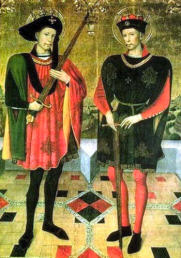
According to legend Abdon and Sennen were two Persians who, under Emperor Decius (249-251), were accused of burying on their estates the bodies of martyrs; for this reason they were thrown into chains at the Emperor's command. As they persistently refused to offer incense to the gods and candidly confessed Jesus as their Lord and God, their imprisonment was made more and more unbearable, and when Decius returned to Rome they were led bound in his triumphal procession. They were dragged before the idols in the capital city, only to spit upon them. Cast to the bears and lions, they were not attacked. Finally they were put to death with the sword. Their bodies were secretly taken away by Christians, and the deacon Quirinus buried them in his house, near the cemetery of S. Pontian, where an old mural of them may still be seen. They are depicted in Persian clothing, receiving from the Lord the crown of victory.
Excerpted from The Church's Year of Grace, Pius Parsch
Symbols: Fur tunics; sword; Phyrygian caps; two crowns.
Things to Do:
- The corporal work of mercy, "to bury the dead," today's saints fulfilled to the letter, and it brought them a glorious martyr's death for Christ. They gave burial to martyrs and themselves were lovingly buried as martyrs. In our day, efficiency and commercialism have to a great extent displaced personal and loving service to the bodies of the dead. Is this the Christian ideal?
St. Germanus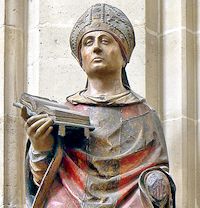
In his youth Germanus gave little sign of sanctity. He was of noble birth, and at first practised the law at Rome. After a time the emperor placed him high in the army. But his one passion was the chase. He was so carried away as even to retain in his sports the superstitions of the pagan huntsmen. Yet it was revealed to the Bishop of Auxerre that Germanus would be his successor, and he gave him the tonsure almost by main force. Forthwith Germanus became another man, and making ever his lands to the Church, adopted a life of humble penance.
At that time the Pelagian heresy was laying waste England, and Germanus was chosen by the reigning Pontiff to rescue the Britons from the snare of Satan. With St. Lupus he preached in the fields and highways throughout the land. At last, near Verulam, he met the heretics face to face, and overcame them utterly with the Catholic and Roman faith. He ascribed this triumph to the intercession of St. Alban, and offered public thanks at his shrine. Towards the end of his stay, his old skill in arms won over the Picts and Scots the complete but bloodless "Alleluia" victory, so called because the newly-baptized Britons, led by the Saint, routed the enemy with the Paschal cry. Germanus visited England a second time with St. Severus.
He died in 448, while interceding with the emperor for the people of Brittany.
Excerpted from Lives of the Saints, by Alban Butler, Benziger Bros. ed. [1894]
The Ruin and Conquest of Britain (excerpt)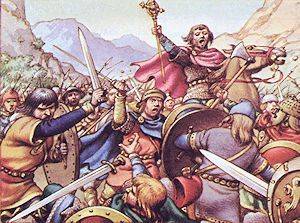
By now the savage host of the enemy was close at hand and Germanus rapidly circulated an order that all should repeat in unison the call he would give as a battle-cry. Then, while the enemy were still secure in their belief that their approach was unexpected, the bishops three times chanted the Alleluia. All, as one man, repeated it and the shout they raised rang through the air and echoed many times in the confined space between the mountains. The enemy were panic-stricken, thinking that the surrounding rocks and the very sky itself were falling on them. Such was their terror that no effort of their feet seemed enough to save them. They fled in every direction, throwing away their weapons and thankful if they could at least save their skins. Many threw themselves into a river which they had just crossed with ease, and were drowned in it. Thus the British army looked on at its revenge without striking a blow, idle spectators of the victory they achieved. The booty strewn everywhere was collected; the pious soldiery obtained the spoils of a victory from heaven. The bishops were elated at the rout of the enemy without bloodshed and a victory gained by faith and not by force.
